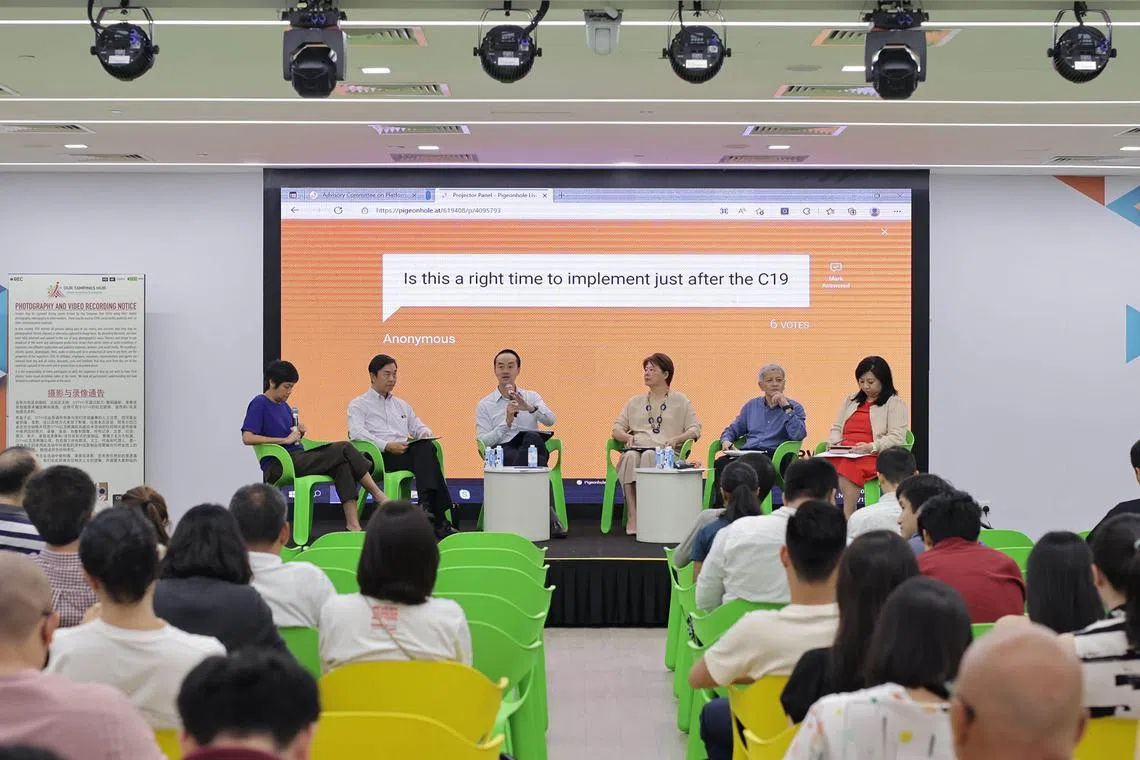Proposals to protect gig workers to be released next week; CPF contributions likely on the table
Sign up now: Get ST's newsletters delivered to your inbox

As at 2020, there were about 79,000 platform workers here, comprising 3 per cent of Singapore’s resident workforce.
PHOTO: ST FILE
SINGAPORE – A committee tasked with finding ways to better protect cabbies, private-hire car drivers and freelance delivery workers will be releasing its recommendations next week, after more than a year of consultations and deliberations.
However, it will likely take at least a year or more before specific measures aimed at improving housing and retirement adequacy, work injury compensation and representation for these workers fully take shape, Senior Minister of State for Manpower Koh Poh Koon said on Tuesday.
Speaking to reporters on the sidelines of a dialogue held at Our Tampines Hub, Dr Koh, who is adviser to the Advisory Committee on Platform Workers, was reluctant to share more details ahead of next week’s announcement, adding that final tweaks were still being made based on Tuesday’s feedback.
But he confirmed that the committee is looking at classifying those who rely on online matching platforms for work in a separate category, somewhere in between a full employee and a fully self-employed person.
Ms Goh Swee Chen, who chairs the advisory committee, also hinted strongly that Central Provident Fund contributions will be among the proposals – though this may be mandatory only for those who need it most.
“Our recommendation is that platform workers should also have access to CPF, which is Singapore’s proposition for retirement and housing adequacy... What we are recommending is to step up to the next level, which is the ordinary and special accounts,” she said during Tuesday’s dialogue.
Savings from the ordinary account can be used for large expenses such as tuition and housing, and when eligible Singaporeans turn 55, these savings, plus savings from the special account, will go towards meeting the applicable retirement sum.
Ms Goh, who also chairs the Institute for Human Resource Professionals, said the advisory committee will take into account the fact that not all platform workers have the same housing or retirement needs.
“Some already have homes, some have homes that are fully paid up. So our thinking is that where the need is most, it would be mandated. But we could consider CPF as voluntary in certain categories of workers,” she added.
As at 2020, there were about 79,000 platform workers here, comprising 3 per cent of Singapore’s resident workforce.
Unlike regular employees, who contribute 20 per cent of their wages to their CPF while their employers contribute 17 per cent, neither platform workers nor their platform companies need to contribute to CPF ordinary or special accounts.
Instead, self-employed people, which include platform workers, need to contribute only about 8 per cent to 10.5 per cent of their income to their MediSave accounts for their healthcare needs, with some platform companies offering schemes that match these contributions.
Set up by the Ministry of Manpower in September 2021, the advisory committee has been floating the idea that platform workers need more contributions to their CPF to ensure they have enough savings for housing and retirement.
But this issue has been a divisive one, as shown in a recent survey of 1,002 food delivery riders by the Institute of Policy Studies, as well as the committee’s own engagements, which found an even split between workers who supported mandatory CPF contributions and those who did not.
Before finalising its proposals, the advisory committee had over the past year reached out to more than 20,000 platform workers, engaged with 20 platform companies and industry associations, and spoken to about 2,700 businesses and consumers who use these platforms.
This is why it has taken the committee so long to release its report, said Dr Koh, adding that it had focused on the quality and quantity of its engagements, rather than setting a fixed deadline.
He said: “This is a very complex piece of work. The workers in this space are very diverse, from the very young to the very old, to those who work many hours to those who do it very casually. And the companies also have somewhat different business models and serve a different customer segment.”
Dr Koh added that the biggest challenge has been ensuring that there is flexibility while providing adequate protections.
He said the committee’s recommendations will be “top-line and broad”, and provide overarching principles on how to help platform workers overcome their vulnerability and precarity, while keeping the ecosystem sustainable.
This will allow room for some adjustments when it comes to implementation.
“That will be the job of the Government, to work closely with the stakeholders, be it the companies or the workers themselves, to make sure that... it is relevant, it is convenient, it is not going to impose too much cost,” he said.

Senior Minister of State for Manpower Koh Poh Koon (third from left) at a dialogue session with platform workers and platform companies held at Our Tampines Hub on Nov 15, 2022.
PHOTO: MINISTRY OF MANPOWER
He added that there will be challenges as technical details are being worked through. There may also be a need to pass new laws or amend existing laws around CPF and work injury compensation, which will need to go through Parliament, and the finer details will also need to be communicated to workers and the public.
Addressing concerns over the cost of the new recommendations and the timing of these proposals, especially when inflation is at a 14-year-high,
“Consumers may have to pay a little bit more... But companies also do their part,” he said.
Dr Koh also added that there is no good time to implement these new protections.
He said: “Focus on the fact that there is now an umbrella sheltering you... The rain will stop eventually, but you need to go where you need to go by the time the rain stops.”
Ms Goh said the committee has put in a proposal to the Government to consider providing support during the transition period.



